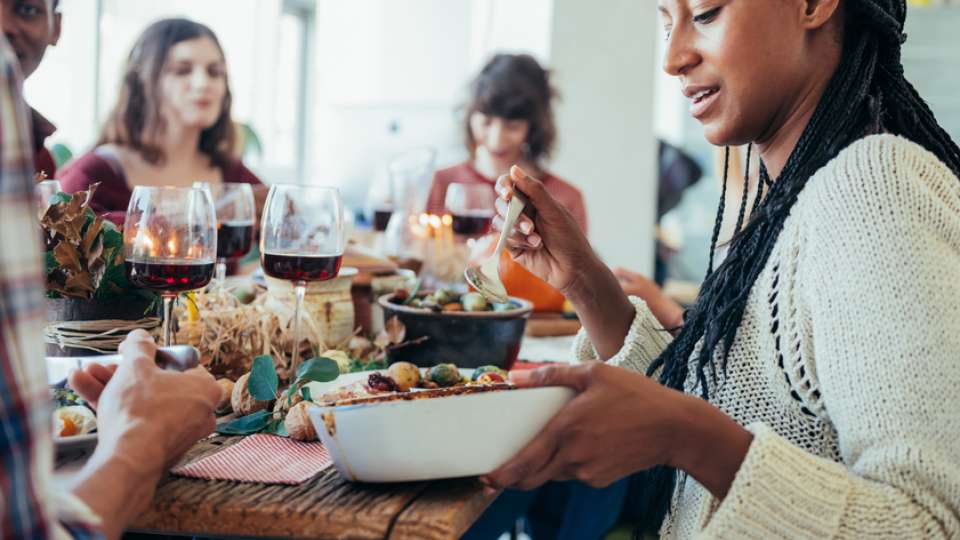
Once again, it’s that time of year that our taste buds love but waistlines hate: Holiday party season. Whether you’re hosting a soiree of your own, RSVP-ing to several gatherings at family and friends’ houses or going out more often, it can be difficult to balance that pie and extra helping of turkey with your diet and healthy eating goals.
Fear not: A few nights of overindulgence probably won’t have much of an impact on your health, says Debra Clancy, R.D., a dietitian who practices at UW Medical Center. If you notice your holiday eating habits are carrying over into everyday life, however, you might want to take a step back and self-assess.
“If it goes on every day, you have to ask yourself what you’re doing and slow down a little. Maybe you need to meet with a dietitian, become more active or make different choices,” she says.
There’s no shame in enjoying food during the holidays, but if you do want to make healthier choices, Clancy has a few tips.
Modify recipes
Whether you’re cooking for a group or yourself, you can control how healthy food is based on what ingredients you add—or omit. For example, use Greek yogurt in ranch or onion dip, or even as a mayo substitute. You can get creative with other sides, too, such as roasted vegetables: Roasted yams are sweet enough on their own without marshmallows. And if you’re baking, decrease the amount of sugar you’re using. Those cookies will still be delicious.
Don’t graze
That prime standing spot right next to the buffet at your office’s holiday party? Let someone else claim it. If you loiter near food, you’re more likely to graze throughout the evening if you’re bored or tempted by that tray of deviled eggs that was just brought out. Station yourself away from the food and only go back for seconds if you’re still hungry.
Dilute your booze
Aside from lowering your inhibitions (including where food is concerned), alcohol can also make you feel hungrier than you actually are. Not to mention the calories in alcohol itself: Four ounces of wine contain 100 extra calories alone. Consider limiting your drinking, choosing wine spritzer instead of wine or asking the host or bartender for a gin and tonic with twice the tonic or soda. And try having a glass of water between adult beverages so you stay hydrated.
Be mindful
Always ask yourself why you’re eating or drinking. Do you want that piece of pie because you love pecan pie, or just because everyone else is having a piece? Learn to recognize when you feel comfortably full but not stuffed. Eat slowly and chew thoroughly, and use smaller plates when possible.
Have a plan
Set yourself up for success by putting some thought into your eating behaviors before you start eating. Plan on making or choosing food that’s more filling and healthier, like vegetable dishes. Tell yourself ahead of time how many sweets you want to eat, and set any other limits for yourself that you’re comfortable with. Maybe even have a snack beforehand so you won’t be starving when you arrive. Skipping meals before a party or holiday meal may seem like a good idea, but it actually sets you up for being so hungry you aren’t as thoughtful about what you consume when good-smelling food is placed in front of you.
Don’t guilt trip yourself
Ultimately, even if you end up eating less healthy foods or more food than you wanted to, don’t beat yourself up over it. Guilt won’t inspire you to make smarter choices; it will only make you feel worse about yourself. If you’re unhappy with your eating choices, do something productive about it, like going for a walk or pre-planning how much you’ll eat next time. And remember that an extra cookie or two or that leftover stuffing probably won’t negatively affect your health in the long run (as long as you don’t make it a habit).

 Healthy ideas for your inbox
Healthy ideas for your inbox





